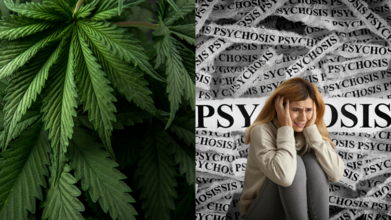- Health Conditions A-Z
- Health & Wellness
- Nutrition
- Fitness
- Health News
- Ayurveda
- Videos
- Medicine A-Z
- Parenting
- Web Stories
What Happens When You Apply Coffee On Your Skin

Coffee For Skin (Credit: Canva)
Coffee is the world's second-most-traded product, only after petroleum. While almost all its consumers depend on it for a morning energy boost, its benefits for the skin are equally mindblowing. If applied with proper consistency, coffee can help you bring out the glow. Moreover, it is rich in antioxidants like phenol, that help fight free radicals that lead to skin damage.
Skin Care Benefits From Coffee
While a cup of coffee can provide antioxidants internally, the purported skin benefits from coffee are primarily obtained topically. This involves making a mask, scrub, or paste from fresh coffee grounds and applying them to your skin directly.
1. Cellulite reduction
Coffee may help reduce the appearance of cellulite on the skin. It’s thought that the caffeine contentTrusted Source in coffee is the key to cellulite reduction by dilating blood vessels beneath the skin and improving overall blood flow. In turn, this may help decrease the appearance of cellulite.
2. Calming effects
While coffee is renowned for its stimulating effects inside the body, it may provide the opposite effects when applied topically. This is thanks to the antioxidants in coffee.
3. Anti-aging benefits
Applying coffee directly to your skin may help decrease the appearance of sun spots, redness, and fine lines. In fact, one studyTrusted Source found a direct correlation between drinking coffee and a decrease in photoaging effects.
4. Vitamin B-3 for skin cancer
Coffee is a rich source of vitamin B3 (niacin), thanks to a breakdown of a key compound called trigonelline. However, trigonelline breaks down into niacin after coffee beans have been roasted. According to the Skin Cancer Foundation, niacin may be helpful in preventing nonmelanoma skin cancers and can possibly prevent other skin growths.
5. Reduced inflammation
Anti-inflammatory effects may be attributed to chlorogenic acidTrusted Source (CGA) as well as melanoidins in coffee. CGA is also linked to reducing hyperpigmentation that may have a connection with inflammation.
6. Acne treatment
In the case of a wound or frequent skin infections, the regular use of coffee could help combat problems from harmful bacteria. The CGAs in coffee have both anti-inflammatory and antibacterial properties. Combined with the natural exfoliation of coffee grounds, all these benefits can collectively fight acne.
7. Dark circles
Coffee may also help treat stubborn dark circles under the eyes, according to Beverly Hills MD Cosmeceuticals. This is because the caffeine content in coffee is thought to help dilate blood vessels that contribute to dark circles.
To use coffee for dark undereye circles:
- Combine ½ tsp each of coffee grounds and olive oil. Add in a couple drops of water to make a small paste in your hand.
- Gently pat underneath your eyes without rubbing.
- Leave the mixture on for five to ten minutes.
- Rinse off with water or gently wipe the mask with a soft cloth. Repeat as often as needed.
8. After-sun care
The same anti-ageing benefits from coffee can also be used for post-sun care. The key here is to make a soothing treatment that your sunburned skin will appreciate — not a mask or a scrub as you would for other skin ailments.
To make a coffee-based skin treatment for a sunburn:
- Brew a fresh cup of coffee. Then, dilute it with cold water.
- Place a soft cloth or a study paper towel in the water and wring out any excess.
- Gently dab the cloth on the affected areas of the skin.
- Repeat several times a day until redness and swelling start to subside.
The Rise of Cannabis-Induced Psychosis in the UK: What It Is and Why You Should Know

Credits: Canva
Cannabis-induced psychosis is becoming increasingly common across the UK. With stronger strains easily available and a perception that weed is harmless, doctors are seeing worrying consequences for mental health.
What Exactly Is Psychosis?
Psychosis is not just a medical term; it describes a mental state where someone loses touch with reality. A person in a psychotic episode may hear voices, see things that are not there, or believe unusual ideas with unshakeable certainty. Everyday surroundings feel warped, thoughts become jumbled, and behaviour can change dramatically. These episodes can last days, weeks, or longer, and while many people recover, some continue to experience symptoms for years.
Psychosis is not a condition in itself but a symptom of underlying mental illnesses such as schizophrenia, bipolar disorder, or drug-induced disorders. And cannabis, once dismissed as a “soft” recreational drug, is increasingly proving to be a serious trigger.
Cannabis and Its Dark Side
The UK has no shortage of cannabis users. In the year to March 2024, about 2.3 million people reportedly admitted to using the drug. But while regular use has halved over the past two decades, psychiatrists are alarmed by a sharp rise in cannabis-induced psychosis cases. The problem is potent modern strains and the growing popularity of “skunk”.
Skunk is produced from unpollinated cannabis plants with naturally higher levels of THC, the psychoactive compound responsible for the drug’s “high”. Unlike traditional varieties, these turbocharged versions can push the brain into paranoia, hallucinations, and even long-term mental health conditions.
The Risk Behind the Smoke
According to reports, the public health problem is deepening. There has been a visible rise in the number of people needing intensive support for psychosis as a result of cannabis use. What begins with smoking a few ‘joints’ and feeling a bit paranoid can easily escalate.
The issue is compounded by the fact that cannabis is readily available online. High-strength weed can be bought and delivered with the same ease as ordering a takeaway. For some users, that ease leads them into dangerous territory. Over time, repeated exposure to potent cannabis does not just spark temporary paranoia; it can cement itself into a chronic psychotic state.
How Cannabis-Induced Psychosis Feels
For those caught in its grip, cannabis-induced psychosis can be terrifying. Hallucinations distort familiar environments, creating confusion and fear. Dissociation leaves people feeling detached from their own bodies or surroundings. Everyday interactions can feel hostile or threatening, and the person’s sense of what is real becomes fragile.
While these symptoms may fade once the drug wears off, for some they linger, leading to severe depression or even suicidal thoughts. Studies suggest cannabis can also trigger schizophrenia in vulnerable individuals, an illness characterised by recurring psychotic episodes, delusions, and long-term disability.
Why Skunk Is Different
You might wonder, why is today’s cannabis so much more risky? The answer lies in THC levels. Traditional cannabis varieties contained lower amounts of this psychoactive compound, and many also carried cannabidiol (CBD), a chemical thought to counteract some of THC’s mind-altering effects. Skunk, however, has been bred to maximise THC and reduce CBD.
This results in a product that is stronger, more destabilising, and far more likely to provoke psychosis. While occasional users may brush it off as a “bad trip”, for others, the effects can be life-altering.
A Growing Health Crisis
Despite the popular image of cannabis as a “chill” substance, psychiatrists are dealing with an entirely different reality. Hospitals and rehab centres across the UK are seeing more young people admitted with psychosis linked to cannabis. Over time, people can reach a psychotic state which would not go away, even if they stop smoking. They can become very depressed or suicidal.
The public health implications are significant. Not only do psychotic disorders put immense strain on the NHS, but they also derail lives, disrupting work, education, and relationships.
Rethinking “Harmless” Weed
The narrative around cannabis has long been tangled. To some, it is a natural plant, a stress reliever, even a medicine. But the reality is more complicated. Yes, cannabis contains compounds with therapeutic potential, but when engineered for potency and consumed regularly, it can become a gateway to enduring mental illness.
People need to know that today’s cannabis is not the same mellow joint their parents smoked in the 1970s. It is stronger, riskier, and capable of tipping vulnerable minds into frightening psychological territory.
Inner Child: How Parents Pass Their Own Fears and Insecurities to Their Kids

Credits: Canva
Inner Child is Health and Me's new mental health series where we deep dive into lesser-known aspects of child psychology and how it shapes you as you grow up. Often unheard, mistaken, and misunderstood, in this series we talk about the children’s perspective and their mental health, something different than you might have read in your parenting books. After all, parenting is not just about teaching but also unlearning.
If you have ever caught yourself saying, “I sound just like my mum,” mid-argument, you are not alone. Parents, without a manual, often pass along their own experiences to their children. Alongside love and values, children often inherit their parents’ fears, insecurities, and the scripts about how to behave. This leads to adults carrying around an inner child who is anxious, overly cautious, or forever trying to live up to expectations that were never truly theirs.
The Echo Chamber of Childhood
Children are natural sponges, soaking up everything their parents say, do, and even avoid. A parent terrified of failure may unknowingly raise a child who fears taking risks. A parent obsessed with appearances might instil self-consciousness in their child, even when no one is actually watching.
Psychologists call this “emotional transmission”, when unspoken anxieties and insecurities quietly seep into the child’s developing mind.
Psychological Impacts
Growing up with inherited fears can shape a child’s mental blueprint. Here are some of the common effects:
- Anxiety as a baseline: When parents constantly worry about money, safety, or success, the child often grows into an adult who assumes the world is unsafe or unstable. Everyday challenges, like public speaking or moving cities, feel larger than life.
- Fear of failure: Children taught to avoid mistakes at all costs might internalise the idea that failure equals worthlessness. This can lead to procrastination, perfectionism, or even refusing to try.
- Chronic self-doubt: A parent’s insecurities about not being “good enough” can echo in the child’s psyche, resulting in adults who question every decision, from career choices to dinner orders.
Personality Shaping
Beyond mental health, parents’ fears subtly shape their child’s personality. Over time, kids adapt their behaviour to keep the peace, win approval, or simply survive emotionally.
- The Overachiever: Born from parents who equate success with love, these children push themselves relentlessly, often burning out before 30.
- The Peacemaker: Children of conflict-avoidant parents may grow into people who apologise for things that are not their fault, just to maintain harmony.
- The Invisible One: If a parent is overly critical, the child might shrink themselves, keeping quiet and small to avoid judgement.
- The Rebel: On the flip side, some children react against parental fears entirely, rebelling not out of defiance but as a desperate attempt to carve out their own identity.
These traits might look different on the surface, but they share a common root: a child adapting to someone else’s fears rather than exploring their own authentic path.
The Stereotypical Tags That Stick
Phrases like “Don’t talk too much”, “Be a good boy/girl”, or “People will laugh at you” might sound harmless at the time, but they work like sticky notes on a child’s developing identity. Over time, the tags become self-fulfilling labels.
“You are shy” morphs into social anxiety.
“You are lazy” becomes an inner critic that would not shut up.
“Do not cry; be strong” hardens into emotional suppression.
What parents might intend as guidance often crystallises into lifelong labels, narrowing the space for children to discover who they actually are.
The Domino Effect
One of the ironies is that these inherited insecurities often circle back. A parent afraid of judgement may raise a child who grows into an adult terrified of criticism and who then passes the same script onto their own kids. This results in the domino effect of fears hopping across generations, disguised as “advice”.
Healing the Inner Child
Awareness is a powerful antidote. Recognising that some of your habits or anxieties are not actually yours but hand-me-downs can be liberating.
Here are some steps that psychologists often recommend:
- Spot the borrowed beliefs: Ask yourself, “Whose voice is this?” when self-doubt creeps in. You might realise it is not your own.
- Challenge the tags: Replace “I am lazy” with “I need rest”. Change “I am not good enough” to “I am learning.”
- Create your own rules: If your parents avoided risks, try something small but daring, like a new hobby or speaking up in a meeting.
- Therapy or journaling: Both are tools for untangling what is yours versus what was planted in you.
Why It Matters
At the end of the day, parents will always pass down something—good or bad. But distinguishing between the love and the fears helps adults reclaim their own narratives. By recognising the echoes of parental insecurities, we give ourselves a chance to parent our inner child with kindness rather than criticism.
Why Allergies Are Almost Nonexistent In Children From THIS Community

(Credit-Canva)
One of the many beliefs that people hold, especially the older generation, is that the new way of living, which is highly protected and sanitized, has made kids weaker. While there are certain evolutionary changes we have developed over the past few centuries, it is arguable whether we are . However, their theory may not be far from the truth, but how do we know that? To this day, there are certain communities who enjoy a quiet living, void of modern possessions like the Amish community.
Surveys have noted that Amish children tend to have lesser allergies or asthma cases, but how?
Why Do Amish Children Have Less Allergies?
Scientists have long known that kids who grow up on traditional farms are less likely to have asthma and allergies. This is called the "farm effect," and it seems to be caused by being around farm animals, especially cows, and the microbes (tiny living things) that are found there.
In a 2018 study, researchers from The University of Manchester and Northern Care Alliance NHS Foundation Trust studied two unique farming communities in the U.S.: the Amish and the Hutterites. Both groups have similar genes and lifestyles, but they farm in very different ways, and this seems to be the reason for their different health outcomes.
Another 2020 study done by the American College of Allergy Asthma & Immunology compared the living of Amish and Old Order Mennonite, who also have a similar style of living, with a few comparable changes.
What Is The Difference Between Amish And Hutterite Living?
The Amish and Hutterites both came from the same group in Europe and have similar lifestyles. They eat similar foods, have large families, and avoid many modern habits like having indoor pets or using the internet. However, their farming practices are completely different.
Amish Farms
The Amish use old-fashioned, family-run farms with horses for work. Their barns are close to their homes, so children are around the animals and barn dust from a young age.
Hutterite Farms
The Hutterites live on large, modern, industrial farms. Their barns are big and located far from their homes, so children have little contact with the animals or barn environment.
This difference in lifestyle led to a major difference in health. The study found that Amish children have a very low rate of asthma (just 5.2%), while Hutterite children have a much higher rate (21.3%). This shows that the environment, not their genes, is the most important factor in preventing asthma.

How Was Amish Health Different From Mennonite Health?
The 2020 study researchers created a survey to compare the health of these two groups. They asked families about different types of allergies they had, as well as their lifestyle and farming practices.
They found that families in both groups lived on farms and drank raw, unprocessed milk. However, the Amish families had more children on average and lived on smaller farms with fewer animals compared to the Mennonite families. The survey results showed a significant difference in health between the two groups:
The Amish families reported having a much lower rate of allergies overall. Only about 26% of Amish households had a family member with an allergy.
The Mennonite families had a much higher rate of allergies, with nearly 47% of households reporting an allergy.
Why Were The Amish Less Likely To Get Allergies?
One key difference is that while both the Amish and Mennonites have large families, Mennonite communities sometimes use modern technology like tractors and electricity. In contrast, the Amish stick to traditional, old-fashioned farming.
This difference in farming methods could change the types of microbes (tiny living things) found in the farm environment. Since other research has shown that these specific microbes are important for preventing allergies, the different farming practices might explain why the Amish have a much lower allergy rate.

How the Environment Protects Against Asthma
The scientists found a key difference in the homes of the two groups: Amish homes had much more endotoxin, a type of dust from bacteria. When this dust was tested on mice, the dust from Amish homes protected the mice from developing asthma. However, dust from Hutterite homes actually made the mice's asthma worse.
This suggests that the kind of dust and microbes you are exposed to matters. The dust in Amish homes is full of "good" microbes that help a child’s immune system grow and develop correctly, preventing it from overreacting and causing asthma.
How Does Immunity Affect Allergies And Asthma?
The study also looked at the children's blood and immune systems. They found that the Amish children’s immune systems were very different from the Hutterite children's. The Amish kids had a stronger innate immune system, which is the body's first defense against germs. Their immune cells were "calm" and seemed to be trained to not overreact to things that can trigger asthma.
This research strongly suggests that the farm effect works by "training" the immune system. Early exposure to a wide variety of microbes helps the body learn how to respond correctly, which in turn protects against asthma.
While these studies give us a lot of great information, there are still many questions to answer. Scientists still need to figure out exactly which microbes or substances in the farm environment are the most protective. They also need to study children at a younger age to see how their immune systems change over time.
But for now, the findings from this research confirm that growing up on a traditional farm and being exposed to its rich environment is a powerful way to protect against asthma and allergies.
© 2024 Bennett, Coleman & Company Limited

